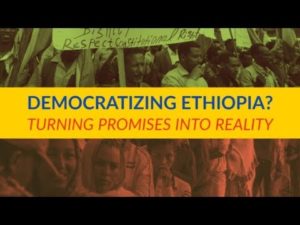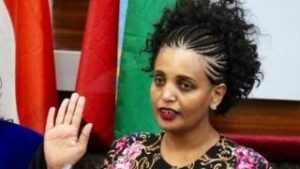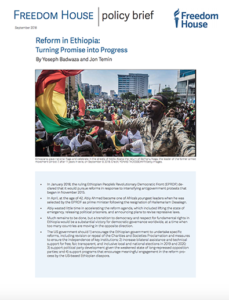 Ethiopian premier Abiy Ahmed’s first 10 months in office have been remarkable by the yardstick of any leader around the world. In that time, he has overseen the swiftest political liberalization in Ethiopia’s more than 2,000-year history, the FT’s David Pilling and Lionel Barber report from Addis Ababa:
Ethiopian premier Abiy Ahmed’s first 10 months in office have been remarkable by the yardstick of any leader around the world. In that time, he has overseen the swiftest political liberalization in Ethiopia’s more than 2,000-year history, the FT’s David Pilling and Lionel Barber report from Addis Ababa:
He has made peace with Eritrea; freed 60,000 political prisoners, including every journalist previously detained; unbanned opposition groups once deemed terrorist organisations; and appointed women to half his cabinet. He has pledged free elections in 2020 and made a prominent opposition activist head of the electoral commission. In a country where government spies were ubiquitous, people feel free to express opinions that a year ago would have had them clapped in jail.
Ethiopia provides a reason to bet heavily on one possibility for a big breakthrough to democracy in the coming year, says Stanford University’s Larry Diamond, co-editor of the NED’s Journal of Democracy.

Ethiopian PM’s Office
Abiy also appointed Birtukan Mideksa (right) as head of the board preparing for the next national elections, scheduled for 2020. Birtukan [a former Reagan-Fascell fellow at the National Endowment for Democracy and a recipient of the A. Philip Randolph Institute’s Bayard Rustin Freedom Award] was one of dozens of opposition figures arrested in the violent aftermath of a 2005 vote – when an opposition coalition challenged the ruling EPRDF’s victory.
Ethiopia’s House of Peoples Representatives this month adopted a Civil Society Proclamation, further encouraging democracy advocates.
“This law is the first major legislative reform measure that the administration of Prime Minister Abiy Ahmed has taken toward ensuring an open operating environment for civil society,” said Yoseph Badwaza, senior program officer for Ethiopia at Freedom House. “The measure demonstrates Ethiopia’s growing commitment to respecting and protecting freedoms of association and assembly.”
 “While there are several concerning provisions in the law, including those that put limits on the activities of international nongovernmental organizations and the broad powers of the Civil Society Agency, the new law is a substantial break from its predecessor,” said Jon Temin, director of Africa programs at Freedom House.
“While there are several concerning provisions in the law, including those that put limits on the activities of international nongovernmental organizations and the broad powers of the Civil Society Agency, the new law is a substantial break from its predecessor,” said Jon Temin, director of Africa programs at Freedom House.
“He says the most unbelievable things and then he ends up doing them,” says Blen Sahilu, a lawyer and women’s rights activist,.
“In many ways, Abiy has been a shock to the system,” she tells the FT. “I’m still waiting to see whether the country can sustain that much change in such a short period of time and if these actions have a thoughtful follow-up strategy.” RTWT
The Democracy, Human Rights, and Labor division of the U.S. Department of State has published a Notice of Funding Opportunity (NOFO): DRL Promotes Worker Rights in Ethiopia.







